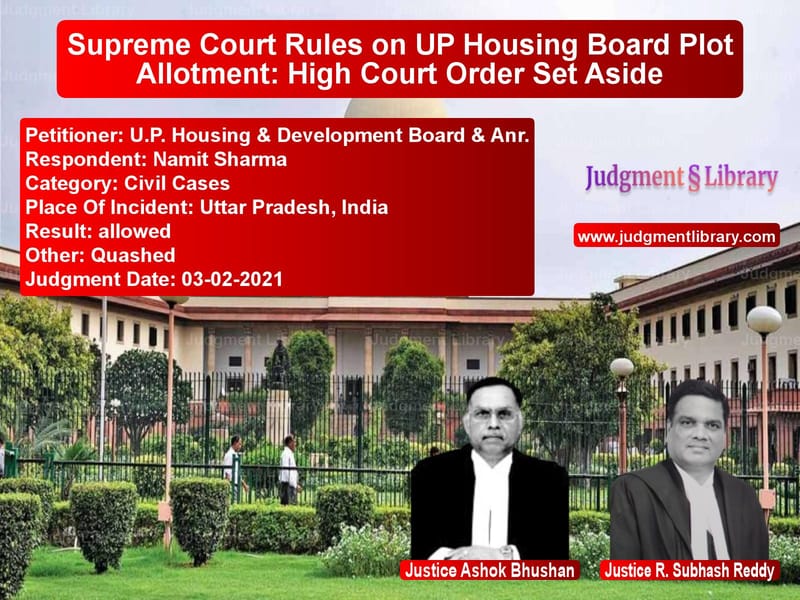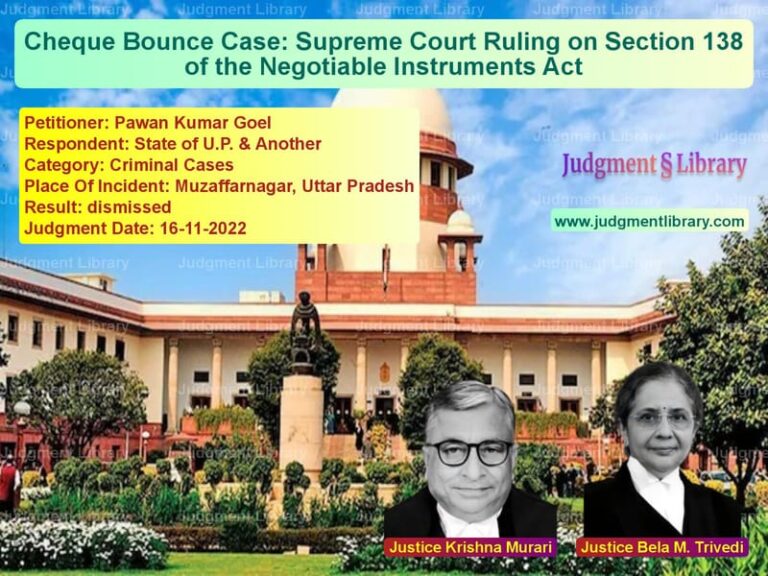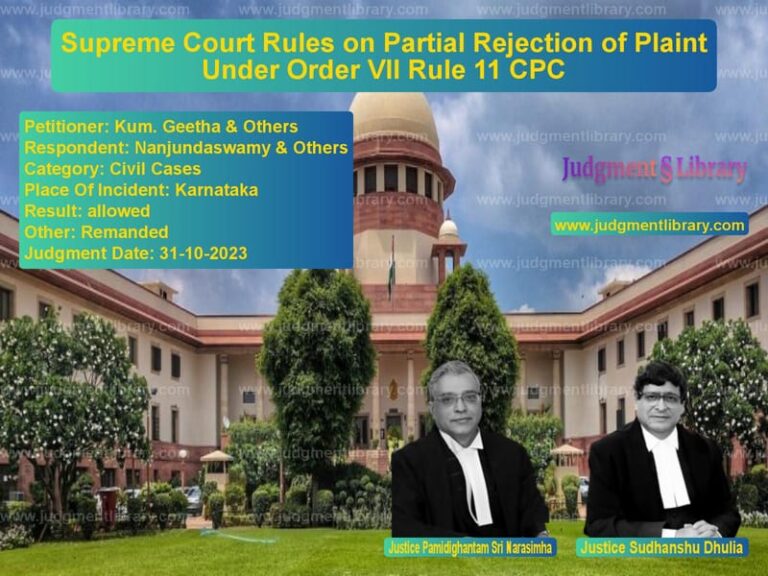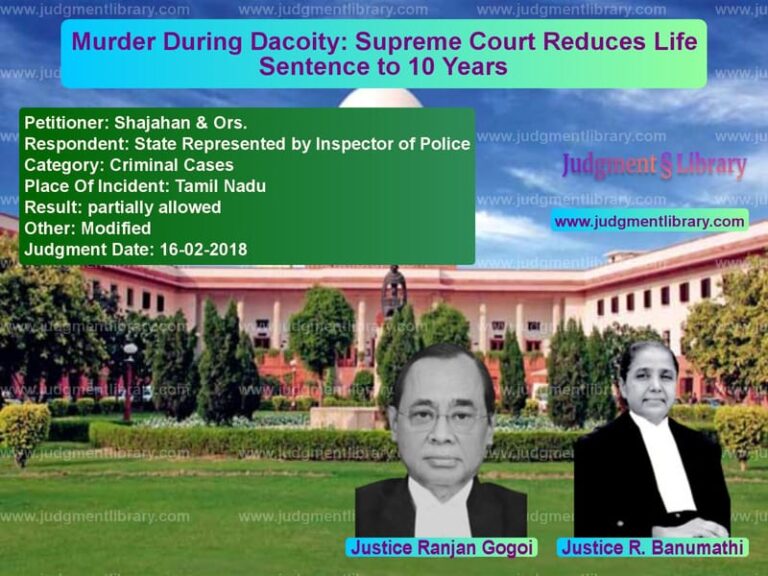Supreme Court Rules on UP Housing Board Plot Allotment: High Court Order Set Aside
The Supreme Court of India recently delivered a significant judgment in the case of U.P. Housing & Development Board & Anr. vs. Namit Sharma, concerning the allotment of a housing plot under a scheme in Uttar Pradesh. The Court ruled against the decision of the Allahabad High Court, which had directed the Housing Board to allot a plot to the respondent, Namit Sharma. The ruling reinforces the principle that housing allotments must be carried out strictly in accordance with government policies and the established procedure.
The judgment was delivered by a bench comprising Justice Ashok Bhushan and Justice R. Subhash Reddy, setting aside the High Court’s direction and ruling that the respondent had no legal entitlement to claim allotment of a plot.
Background of the Case
Plot Registration Under the Housing Scheme
In 1982, Shri M.L. Sharma, the grandfather of the respondent, registered for an HIG (High-Income Group) plot in a Housing Scheme launched by the U.P. Housing & Development Board (UP Housing Board). The registration was made under Registration No. L.W./P-2951(6).
Before his death on June 9, 1984, M.L. Sharma nominated his grandson, Namit Sharma (the respondent), as the nominee for this registration. He also appointed the respondent’s mother, Sudha Sharma, as his guardian for managing the registration until Namit attained adulthood.
Cancellation of Registration and Government Policy Change
Following the death of M.L. Sharma:
- The UP Housing Board requested additional registration money due to price escalations, but this was not paid.
- Sudha Sharma, the mother of the respondent, later sought a refund of the registration amount, indicating a withdrawal from the scheme.
- On October 11, 2002, the Uttar Pradesh Government issued a policy stating that all old registrations of unsuccessful applicants would not be renewed and would be refunded instead.
- Subsequently, the Housing Board rejected the respondent’s request to transfer his grandfather’s registration in his name, citing the government policy.
High Court Order Mandating Plot Allotment
After being denied a plot, Namit Sharma approached the Allahabad High Court, Lucknow Bench, seeking an order directing the Housing Board to allot a plot to him under his grandfather’s registration. The High Court ruled in his favor and directed the Housing Board to allot a plot.
Aggrieved by this ruling, the UP Housing Board appealed to the Supreme Court, arguing that the High Court had erred in issuing the order.
Supreme Court’s Observations and Ruling
Government Policy Prevails Over Individual Claims
The Supreme Court emphasized that government policies regarding housing allotment must be followed strictly. It observed:
“The registration of M.L. Sharma was not an entitlement to a plot. It merely allowed participation in the allotment process, which was to be decided through a lottery system. Since no allotment had been made in his favor, there was no right that could be transferred to the respondent.”
Impact of the 2002 Government Order
The Court ruled that the October 11, 2002 government order was binding and that:
“The government policy clearly states that all old registrations that did not result in allotment would be refunded, not renewed. The respondent’s claim for a plot was inconsistent with this policy.”
High Court Overstepped its Authority
The Supreme Court found that the High Court had exceeded its authority by issuing directions contrary to government policy:
“The High Court erred in directing the Housing Board to allot a plot to the respondent without considering the government policy, which categorically barred such claims.”
Final Judgment
- The Supreme Court set aside the Allahabad High Court’s order.
- The Court ruled that the respondent was not entitled to allotment under his grandfather’s registration.
- The Housing Board was directed to refund the registration amount as per the 2002 government policy.
- The Court reaffirmed that all allotments must be carried out in accordance with established rules and procedures.
Key Takeaways from the Judgment
- Housing registration does not guarantee allotment; it only provides eligibility to participate in the draw of lots.
- Government policy takes precedence over individual claims, ensuring fair and uniform housing allocation.
- High Court cannot issue directions contrary to policy; courts must respect executive decisions in administrative matters.
- Nomination by a registrant does not create a legal right for the nominee unless allotment is made.
- Refund of registration money is the only recourse for unsuccessful applicants as per the policy.
Impact of the Judgment
The ruling reinforces the importance of following government policies in housing allotments. It prevents individuals from claiming entitlement to plots based on outdated registrations and ensures that all applicants are treated fairly under the applicable rules.
Conclusion
The Supreme Court’s judgment in U.P. Housing & Development Board & Anr. vs. Namit Sharma upholds the rule of law in public housing schemes. By setting aside the High Court’s directive, the Court has reaffirmed the supremacy of government policies in determining eligibility for housing allotments, ensuring transparency and fairness in public schemes.
Petitioner Name: U.P. Housing & Development Board & Anr..Respondent Name: Namit Sharma.Judgment By: Justice Ashok Bhushan, Justice R. Subhash Reddy.Place Of Incident: Uttar Pradesh, India.Judgment Date: 03-02-2021.
Don’t miss out on the full details! Download the complete judgment in PDF format below and gain valuable insights instantly!
Download Judgment: u.p.-housing-&-devel-vs-namit-sharma-supreme-court-of-india-judgment-dated-03-02-2021.pdf
Directly Download Judgment: Directly download this Judgment
See all petitions in Property Disputes
See all petitions in Contract Disputes
See all petitions in Judgment by Ashok Bhushan
See all petitions in Judgment by R. Subhash Reddy
See all petitions in allowed
See all petitions in Quashed
See all petitions in supreme court of India judgments February 2021
See all petitions in 2021 judgments
See all posts in Civil Cases Category
See all allowed petitions in Civil Cases Category
See all Dismissed petitions in Civil Cases Category
See all partially allowed petitions in Civil Cases Category







